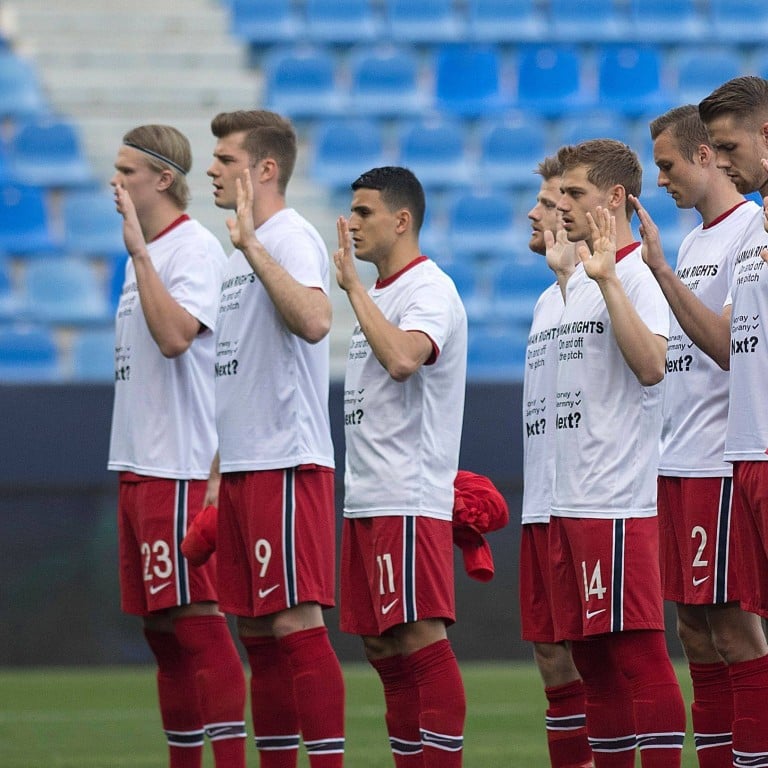
World Cup Qatar 2022 and Bahrain F1 get political as sport answers back
- Norwegian FA have started conversation over the next Fifa World Cup with Germany and Netherlands following suit in T-shirts
- Depth of ‘sportswashing’ means that there is no slow fix and criticism of gesture and players misses the bigger picture
“Norway, check. Germany, check. Next?”
That was the question on the Norway men’s national team T-shirts ahead of their game with Turkey and the answer was soon clear: the Netherlands.
“Football for change” their pre-match shirts said at the Johan Cruyff Arena in Amsterdam.
More will surely follow a move started by Norway last week ahead of playing Gibraltar, as Denmark did on Sunday.
“Human rights on and off the pitch” those first pre-match T-shirts said, coming off the back of calls from Norwegian clubs led by Tromso.
Germany’s players wore T-shirts spelling out “Human Rights” ahead of their game against Iceland.
Anthony Joshua vs Andy Ruiz Saudi Arabia fight latest – but not the last – sports-washing success
As you might expect, there has been criticism, whataboutery and heads in the sand.
Yes, Norway might not boycott the World Cup if they qualify – and they also might not qualify based on their 3-0 defeat to Turkey – but they have agreed to discuss it at an official FA meeting.
That’s not to say boycotts even work but they have started the discussion in the wider football world.
There have been questions of where Norway’s star striker Erling Braut Haaland will end up next with Qatar-owned PSG or Abu Dhabi-backed Manchester City among the leaders for his signature.
Just as there has been criticism for Manchester City player Ilkay Gundogan being among the players in the German side to spell out “Human Rights”.
Criticism of players misses the point. It is not down to the individual players but collectively behind their national football associations.
Netherlands players aim human rights protest at Qatar ahead of football World Cup qualifier
Others have even pointed to Germany’s arms deals with Saudi Arabia but the FA’s powers only reach so far and they have at least raised the issue.
There is also the flip side where fans of clubs are unwilling to hear criticism, arguing that neither Manchester City nor owners City Football Group have been convicted of human rights abuses so it is all moot.
As it happens, there has been more emboldened talk from some players with Netherlands pair Mathijs De Ligt and Memphis Depay both speaking out after the game, while Germany’s Leon Goretzka told how the players painted the letters themselves.
“We have the World Cup coming up and there will be discussions about it. We wanted to show we are not ignoring that,” Goretzka, scorer of the opening goal, told German broadcaster RTL.
Several players have mentioned the platform they have but that distracts from the bigger picture.
It is not the players that have allowed “sportwashing” it is those in power.
Soft power sponsorships: how Qatar uses sport to promote a positive picture to the outside world
The fact it takes in European club ownership and sponsorship – Goretzka’s Bayern Munich have links to Qatar, including Qatar Airways being their sleeve sponsor – shows how far it is seeped into the game.
One thing at a time though.
The next World Cup is in Qatar. That is the issue at hand for them and to speak up on it is their right – and they are in the right.
This World Cup is different, not least because it is set for November rather than summer but it is under more scrutiny than any before because of the hosts.
Qatar 2022 is an almost textbook example of a state changing its reputation through sport and Fifa are the ones to hold to account, not a 19-year-old footballer like Haaland.
Fifa have stayed silent over alarming reports from the country relating to the untimely deaths of migrant workers – which The Guardian put at 6,500 last month – and their rights in general in planning for the tournament. They have done so since it was awarded in 2010.
English Premier League clubs could pay for banking on China cash
It is odd that Fifa’s response to this new wave of pre-match protest has been so welcoming.
“Fifa believes in the freedom of speech, and in the power of football as a force for good,” football’s governing body said in a statement after Norway beat Gibraltar. “No disciplinary proceedings in relation to this matter will be opened by Fifa.”
Now though there is a generation of athletes who are more willing to speak up and speak out and the Norwegian FA have the backing of their public, according to a recent poll.

Footballers are far from the only ones and Formula One driver Lewis Hamilton talked about going to see the UK ambassador in Bahrain ahead of this season’s opening Grand Prix.
“There are issues all around the world but I do not think we should be going to these countries and just ignoring what is happening in those places, arriving, having a great time and then leave,” the Mercedes driver said in a press conference ahead of the season-opening race in Bahrain.
This is not the end of sportswashing. Let’s be honest, that is not in sight.
Naomi Osaka and Lewis Hamilton vow to carry on fight for social justice
It will be there when Saudi Arabia likely hosts Anthony Joshua vs Tyson Fury or whatever other megafight they have in line next. It is there with every passing round of the Uefa Champions League. It will be wherever sporting bodies take their globalised games.
But just as sportswashing has become the norm in football and beyond, so has the newly politicised athlete, those who have shown their support for Black Lives Matter and racial equality by taking the knee; so has a change in public sentiment.
That shift – and these T-shirts – are the first step for the dirty laundry of sportwashing to be aired in public.

